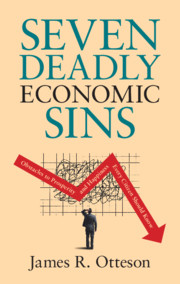Book contents
- Seven Deadly Economic Sins
- Seven Deadly Economic Sins
- Copyright page
- Dedication
- Contents
- Preface
- Introduction
- 1 Wealth Is Positive-Sum
- 2 Good Is Not Good Enough
- 3 There Is No Great Mind
- 4 Progress Is Not Inevitable
- 5 Economics and/or Morality
- 6 Equality of What?
- 7 Markets Are Not Perfect
- Conclusion
- Postscript
- References and Further Reading
- Acknowledgments
- Index
4 - Progress Is Not Inevitable
Published online by Cambridge University Press: 09 April 2021
- Seven Deadly Economic Sins
- Seven Deadly Economic Sins
- Copyright page
- Dedication
- Contents
- Preface
- Introduction
- 1 Wealth Is Positive-Sum
- 2 Good Is Not Good Enough
- 3 There Is No Great Mind
- 4 Progress Is Not Inevitable
- 5 Economics and/or Morality
- 6 Equality of What?
- 7 Markets Are Not Perfect
- Conclusion
- Postscript
- References and Further Reading
- Acknowledgments
- Index
Summary
We live in an age of superabundance. Between 1980 and 2017, the real (inflation-adjusted) price of commodities worldwide declined by an average of 36.3 percent. During that same period, real average annual per-capita income rose 63.2 percent, and population-adjusted average annual hours worked per worker declined by 9.4 percent. That means that real average hourly income per worker increased by a whopping 80.1 percent. And during that same period, the abundance of resources worldwide, despite a population growth of 170 percent, increased by an incredible 479.6 percent (Pooley and Tupy 2018). A person born after 1980 – part of the so-called Millennial generation – could therefore be forgiven for believing not only that we live in an age of plenty (which we do) but that the engines of growth will churn forever, more or less regardless of what we do or what policies we adopt.
- Type
- Chapter
- Information
- Seven Deadly Economic SinsObstacles to Prosperity and Happiness Every Citizen Should Know, pp. 121 - 145Publisher: Cambridge University PressPrint publication year: 2021

